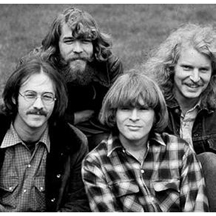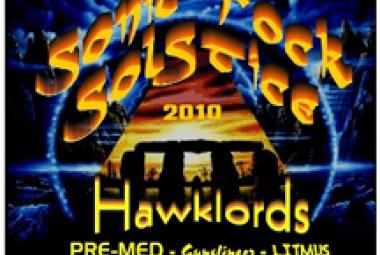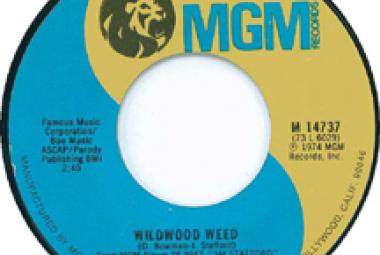CREEDENCE CLEARWATER REVIVAL
Creedence Clearwater Revival (often shortened to “Creedence” or “CCR”) was an American rock band active in the late 1960’s and early 1970’s. The band consisted of lead vocalist, lead guitarist, and primary songwriter John Fogerty, rhythm guitarist Tom Fogerty, bassist Stu Cook, and drummer Doug Clifford. Despite their San Francisco Bay Area origins, they portrayed a Southern rock style, with lyrics about bayous, catfish, the Mississippi River, and other popular elements of Southern American iconography, as well as political and socially-conscious lyrics about topics including the Vietnam War. Creedence Clearwater Revival’s music is still a staple of American radio airplay; the band has sold 26 million albums in the United States alone. (More from Wikipedia)
Another tragic example is that of Creedence Clearwater Revival; their recording contract with Fantasy Records is widely regarded as the worst ever of any major recording artist in this country. CCR is one of the few rock bands that was adept not only at crafting irresistible singles, but also at placing them on albums that, if anything, were even better – the extended jam on their first hit song “Suzie Q” in 1968 (their only major hit that was not written by bandleader John Fogerty – the Rolling Stones is one of many artists that had previously recorded the song) is just a sample of those that await discovery on the band’s albums during their long hitmaking period.
The acrimony among the bandmembers started not long after “Suzie Q” became a hit. Rhythm guitarist Tom Fogerty (John’s younger brother) in particular had long felt ignored within the band and finally left the group for good in January 1971. Eventually, John Fogerty refused to work with Fantasy at all, and he made only minimal contributions to the band’s final album in 1972, Mardi Gras, insisting that he would not sing any of the songs written by the two other bandmembers, bassist Stu Cook and drummer Doug Clifford. The album was panned by the critics, with Rolling Stone reviewer Jon Landau marking it as “the worst album I have ever heard from a major rock band”. The only reunion of Creedence Clearwater Revival with all four original members occurred at Tom Fogerty’s wedding in 1980. Remarkably, Tom Fogerty sided with Fantasy Records during his brother’s bitter disputes with their label.
John Fogerty refused to perform any of his Creedence Clearwater Revival songs for many years in order to prevent any future proceeds from going to Fantasy Records owner Saul Zaentz, and this naturally hampered his efforts to start a solo career in the early 1970’s. Ultimately, John Fogerty signed away all of his rights to the Creedence material in the mid-1970’s, in exchange for being able to get out from under the CCR’s onerous recording contract – the band still owed the label eight (!) more albums at that point.
When David Geffen’s Asylum Records purchased his recording contract for $1,000,000 from Fantasy Records (later joined by Warner Bros. Records) – though those rights applied only for North America; John Fogerty’s worldwide rights remained with Fantasy – John Fogerty finally was able to re-establish himself as a major rock artist with his 1985 hit album Centerfield. The title track, “Centerfield” quickly became one of the best-loved baseball songs in the country. Fogerty couldn’t resist tweaking his old nemesis Saul Zaentz at Fantasy with two other tracks, “Mr. Greed” and “Zanz Kant Danz” (about a pig who can’t dance but would “steal your money”); after a while, he was forced to change the name of the latter song to “Vanz Kant Danz”.
Saul Zaentz perhaps sought revenge by suing John Fogerty for $1,000,000 over another hit single from the same album, “The Old Man Down the Road”, alleging that the song basically had the same chorus as the 1970 Creedence Clearwater Revival song “Run through the Jungle” – essentially, Fogerty was being sued for plagiarizing himself! After John Fogerty was able to establish in court that the two were separate songs, he then counter-sued Saul Zaentz for his legal expenses – a case that went all the way to the U. S. Supreme Court. Tom Fogerty ultimately died in 1990 of complications from AIDS via tainted blood transfusions, and the brothers hadn’t been on speaking terms for years previously.
With all of that animosity as background, it is small wonder, then, that John Fogerty refused to perform with his surviving former bandmates, Stu Cook and Doug Clifford when Creedence Clearwater Revival was inducted into the Rock & Roll Hall of Fame in 1993, though he did perform several CCR songs with a different backing band that night. Cook and Clifford did start a band in 1995 called Creedence Clearwater Revisited that still tours widely.
* * *
I can’t end this story about Creedence Clearwater Revival without mentioning the Vietnam Veterans Benefit Concert near Washington, D.C., on July 4, 1987. Sadly, this event – which was nationally televised on HBO – seems to be largely forgotten today; it is even omitted from the “1987 in music” article in Wikipedia. I took the concert to be, in large part, an apology from the 1960’s counter-culture for their disgraceful treatment of Vietnam Veterans (if I am not mistaken, even Jane Fonda put in an appearance), though no one was taking back anything that they had said about the politicians and many of the generals.
Several of the performers that had appeared at the original Woodstock Music & Art Fair in 1969 were in attendance: Richie Havens, Country Joe, John Sebastian, and Crosby, Stills, Nash & Young (at least individually, with Stephen Stills and Neil Young appearing in a reformed Buffalo Springfield). By the way, hardly anyone knows that Creedence Clearwater Revival was also a headliner at Woodstock; however, their subpar performance didn’t start until 3:00 a.m. (after the Grateful Dead) and was omitted from the film and concert albums (though they did make the 1994 box set). Other musicians at the Vietnam Veterans Benefit Concert included James Brown, Stevie Wonder, the Byrds, Bonnie Raitt, Kris Kristofferson, Linda Ronstadt, Frankie Valli, and the Four Tops; and there were also speeches by John Ritter, Louis Gossett, Jr., Whoopi Goldberg, Oliver Stone, and Ed Asner.
In spite of the stellar line-up, the promoters of the Vietnam Veterans Benefit Concert could hardly contain themselves whenever they spoke of John Fogerty and his performance at long last of several of his Creedence Clearwater Revival songs for basically the first time in 15 years. His set included “Born on the Bayou”, “Down on the Corner”, “Who’ll Stop the Rain”, and “Fortunate Son”. That performance is truly one of the most thrilling concerts that I have ever seen – on television or in person. In-between songs, John Fogerty made a heartfelt speech to the veterans that also showed that he was beginning to come to terms with his own painful history:
“I just want to tell you something real short and sweet. I’m talking to vets here. I myself had gone through about 20 years of pain, and I finally faced that pain. I looked it right in the face and said, well, you got a choice: You can do it for 20 more years, or you can just say, ‘That’s what happened.’ You can’t change it, that’s just what happened. So I’m telling you guys, that’s what happened. You got the shaft. You know it, we know it, it’s reality. So drop it. In fact – [crowd reaction] You got it. Send me a letter, Berkeley, California, but you promise me something: You send the letter, you drop it in the box, and then you drop all that s--t you been carrying around. Is that a deal? And get on with it, buddy!”
* * *
The British Invasion caught American recording artists flat-footed; they were not used to any overseas competition to speak of. Creedence Clearwater Revival and a revitalized Beach Boys are two of the responses by American recording artists to the British Invasion.
(January 2013)
* * *















